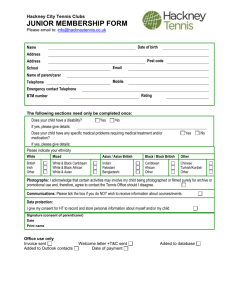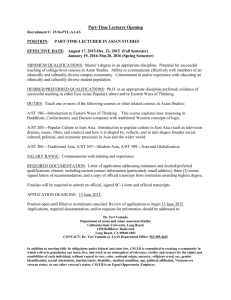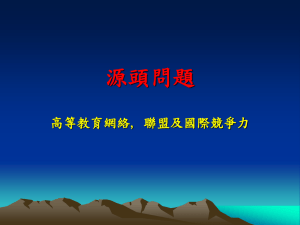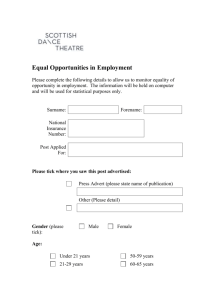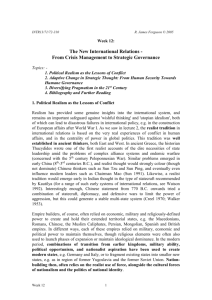Asian Leadership- Call for Proposals-3
advertisement
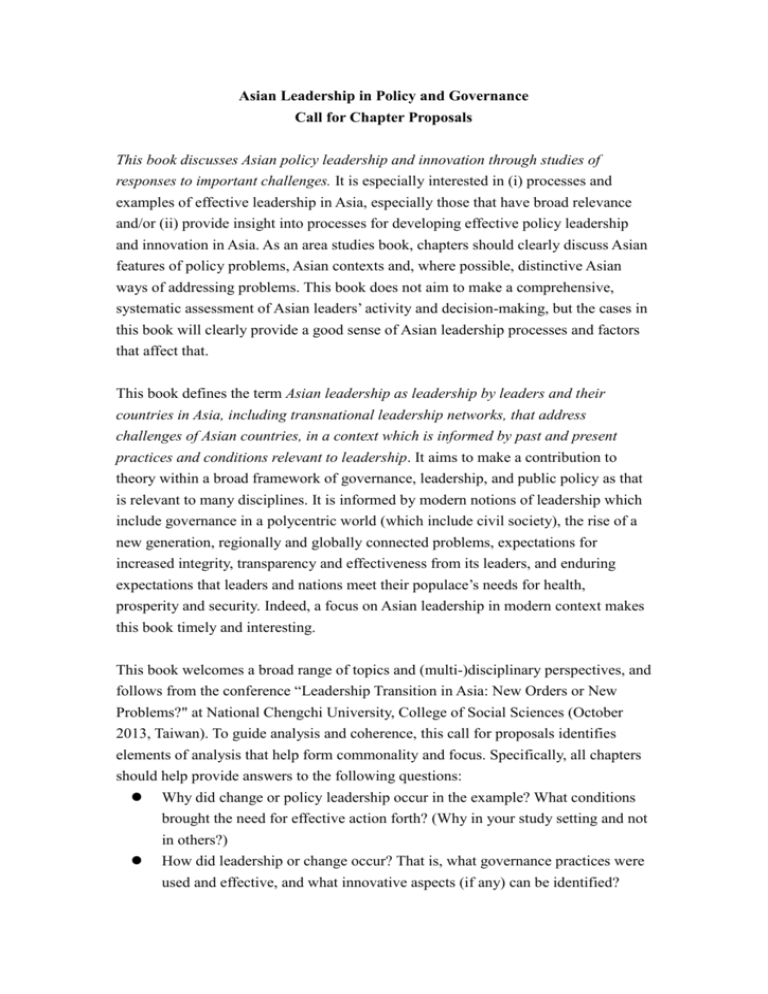
Asian Leadership in Policy and Governance Call for Chapter Proposals This book discusses Asian policy leadership and innovation through studies of responses to important challenges. It is especially interested in (i) processes and examples of effective leadership in Asia, especially those that have broad relevance and/or (ii) provide insight into processes for developing effective policy leadership and innovation in Asia. As an area studies book, chapters should clearly discuss Asian features of policy problems, Asian contexts and, where possible, distinctive Asian ways of addressing problems. This book does not aim to make a comprehensive, systematic assessment of Asian leaders’ activity and decision-making, but the cases in this book will clearly provide a good sense of Asian leadership processes and factors that affect that. This book defines the term Asian leadership as leadership by leaders and their countries in Asia, including transnational leadership networks, that address challenges of Asian countries, in a context which is informed by past and present practices and conditions relevant to leadership. It aims to make a contribution to theory within a broad framework of governance, leadership, and public policy as that is relevant to many disciplines. It is informed by modern notions of leadership which include governance in a polycentric world (which include civil society), the rise of a new generation, regionally and globally connected problems, expectations for increased integrity, transparency and effectiveness from its leaders, and enduring expectations that leaders and nations meet their populace’s needs for health, prosperity and security. Indeed, a focus on Asian leadership in modern context makes this book timely and interesting. This book welcomes a broad range of topics and (multi-)disciplinary perspectives, and follows from the conference “Leadership Transition in Asia: New Orders or New Problems?" at National Chengchi University, College of Social Sciences (October 2013, Taiwan). To guide analysis and coherence, this call for proposals identifies elements of analysis that help form commonality and focus. Specifically, all chapters should help provide answers to the following questions: Why did change or policy leadership occur in the example? What conditions brought the need for effective action forth? (Why in your study setting and not in others?) How did leadership or change occur? That is, what governance practices were used and effective, and what innovative aspects (if any) can be identified? 2 What pre-conditions for success or failure are associated with your case? What challenges or barriers to policy leadership were experienced in the process, and how were they overcome by actors? What results were achieved? If your topic is on leadership itself (rather policy), what Asian conditions affect leadership development and success, and what innovations (if any) occurred that are relevant for other settings? It is acknowledged that for some important topics of social and economic change, public leadership is sometimes somewhat of a background variable. However, as we want to learn about leadership and governance in a polycentric world, etc, it is essential to give public leadership its due, showing what public leaders or bodies did to help such action along, or what they should have done more. This is a book in Emerald’s Public Policy and Governance series. Chapters should include consideration for basic concepts of leadership and governance, and Asian conditions affecting policy responses and leadership culture. (A background document may include suggestions about these.) The book plans to present a cross-section of topics that are of critical contemporary interest about Asia. By example, areas of interest include economic integration (involving often rival countries), cross-strait relations (what did leaders do and innovate that could be relevant to other conflict settings?), trans-national environmental problems (how to enforce?), social problems related to labor migration, and North Korea relations (how do leaders deal with that regime and preserve a fragile peace). Other areas of interest include public leadership development and selection (what is the capacity of people in leadership positions for delivering leadership?), new institutional arrangements which further domestic political stability (Sri Lanka?) or better relations across sectors (role of NGOs), corruption and integrity management, and so on. The above bulleted questions are relevant to these topics. Asian Leadership in Policy and Governance aims to make a scholarly contribution, drawing relevant and timely conclusions and, hopefully, providing new examples of Asian leadership in our literature. Authors can expect the book to go into production by the end of 2014. Chapters will be due around August/September 2014. While authors may wish to focus on a single country, the pan-Asian focus means that some effort should be taken, at some point, to explore implications for other countries. Next step: Please email your proposal to Evan Berman, evanmberman@gmail.com , providing a brief (one page?) outline of your proposed chapter, on or before March 7, 2014. Students can also consider co-authorship with one of their professors, of course.

